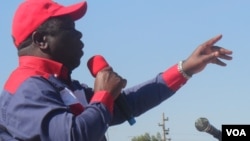WASHINGTON DC —
Former Prime Minister Morgan Tsvangirai’s Movement for Democratic Change formation is wrapping up a two-day national executive meeting to map the way forward after performing dismally in the July 31 general elections against President Robert Mugabe’s Zanu-PF.
Party leaders are barred from speaking with the press about the details of the meeting, but unconfirmed reports say the executive, which started deliberations Tuesday, has only discussed one item on the agenda, a sign that the party may be feeling an existential crisis.
Many MDC supporters say they feel frustrated, angry, and unsure of the future. Many members have criticized what they call a lack of leadership and say MDC should have done more to prepare for the elections while they had a majority in parliament during the unity government era.
There is even strife among party leaders, with long-standing treasurer Roy Bennett saying last week he would resign if his party accepted any posts within the Zanu-PF government.
Some party activists in the youth and women’s leagues have called for Mr. Tsvangirai to be replaced, as after three attempts he has failed to beat President Mugabe in elections. However, other activists say any move to replace the iconic Tsvangirai would simply cause the party to collapse.
Sources in the MDC-T said their national executive discussed issues related to how the party can reverse the outcome of the elections which saw President Mugabe romping to victory with 61 percent of total votes cast while Mr. Tsvangirai was a distant second with 33.9 percent.
Following its defeat, insiders in the MDC national executive said the party has been self-introspecting with divisions said to be coming to the surface, pitting some people behind organizing secretary Nelson Chamisa and secretary general Tendai Biti.
It was agreed that apart from the alleged rigging of the vote, its campaign was affected by poor funding and lack of sellable policy messages to the electorate.
The imposition of candidates in some constituencies is also an issue on the table for splitting the party’s votes. The sources said the party will now regroup after the meeting to focus on the next course of action.
Although the sources have not disclosed their party’s next step, Mr. Tsvangirai is on record saying the MDC will pursue democratic means to remove Zanu PF from office.
According to the sources, the MDC will pile diplomatic pressure on Mr. Mugabe’s administration and concentrate on rebuilding its structures ahead of the next elections expected in 2018.
Some sources claimed that outgoing Co-Home Affairs Minister Theresa Makone was taken to task by the executive over her failure to ascertain the activities of an Israeli company called Nikuv that the MDC claims was part of Zanu PF’s rigging machinery.
Nikuv has refused to comment on the issue.
Party leaders are barred from speaking with the press about the details of the meeting, but unconfirmed reports say the executive, which started deliberations Tuesday, has only discussed one item on the agenda, a sign that the party may be feeling an existential crisis.
Many MDC supporters say they feel frustrated, angry, and unsure of the future. Many members have criticized what they call a lack of leadership and say MDC should have done more to prepare for the elections while they had a majority in parliament during the unity government era.
There is even strife among party leaders, with long-standing treasurer Roy Bennett saying last week he would resign if his party accepted any posts within the Zanu-PF government.
Some party activists in the youth and women’s leagues have called for Mr. Tsvangirai to be replaced, as after three attempts he has failed to beat President Mugabe in elections. However, other activists say any move to replace the iconic Tsvangirai would simply cause the party to collapse.
Sources in the MDC-T said their national executive discussed issues related to how the party can reverse the outcome of the elections which saw President Mugabe romping to victory with 61 percent of total votes cast while Mr. Tsvangirai was a distant second with 33.9 percent.
Following its defeat, insiders in the MDC national executive said the party has been self-introspecting with divisions said to be coming to the surface, pitting some people behind organizing secretary Nelson Chamisa and secretary general Tendai Biti.
It was agreed that apart from the alleged rigging of the vote, its campaign was affected by poor funding and lack of sellable policy messages to the electorate.
The imposition of candidates in some constituencies is also an issue on the table for splitting the party’s votes. The sources said the party will now regroup after the meeting to focus on the next course of action.
Although the sources have not disclosed their party’s next step, Mr. Tsvangirai is on record saying the MDC will pursue democratic means to remove Zanu PF from office.
According to the sources, the MDC will pile diplomatic pressure on Mr. Mugabe’s administration and concentrate on rebuilding its structures ahead of the next elections expected in 2018.
Some sources claimed that outgoing Co-Home Affairs Minister Theresa Makone was taken to task by the executive over her failure to ascertain the activities of an Israeli company called Nikuv that the MDC claims was part of Zanu PF’s rigging machinery.
Nikuv has refused to comment on the issue.




